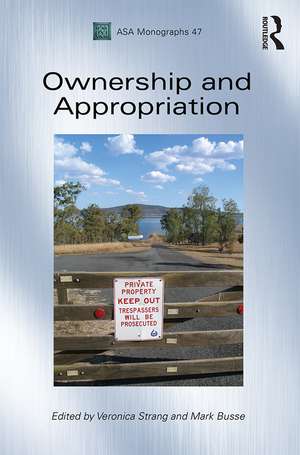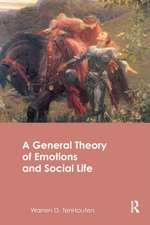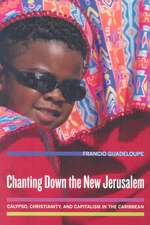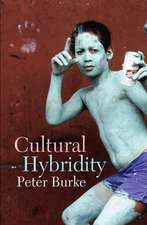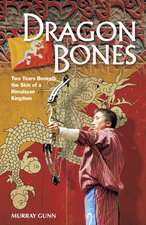Ownership and Appropriation: ASA Monographs
Editat de Veronica Strang, Mark Busseen Limba Engleză Paperback – 2 feb 2012
Din seria ASA Monographs
-
 Preț: 372.82 lei
Preț: 372.82 lei - 17%
 Preț: 259.98 lei
Preț: 259.98 lei -
 Preț: 368.37 lei
Preț: 368.37 lei -
 Preț: 436.45 lei
Preț: 436.45 lei - 18%
 Preț: 1002.02 lei
Preț: 1002.02 lei -
 Preț: 367.83 lei
Preț: 367.83 lei -
 Preț: 349.80 lei
Preț: 349.80 lei -
 Preț: 367.90 lei
Preț: 367.90 lei -
 Preț: 344.09 lei
Preț: 344.09 lei -
 Preț: 412.37 lei
Preț: 412.37 lei -
 Preț: 414.32 lei
Preț: 414.32 lei - 49%
 Preț: 210.27 lei
Preț: 210.27 lei -
 Preț: 411.42 lei
Preț: 411.42 lei -
 Preț: 436.14 lei
Preț: 436.14 lei -
 Preț: 377.66 lei
Preț: 377.66 lei -
 Preț: 345.01 lei
Preț: 345.01 lei -
 Preț: 345.61 lei
Preț: 345.61 lei -
 Preț: 373.98 lei
Preț: 373.98 lei - 18%
 Preț: 892.65 lei
Preț: 892.65 lei - 18%
 Preț: 1005.01 lei
Preț: 1005.01 lei -
 Preț: 284.24 lei
Preț: 284.24 lei -
 Preț: 395.16 lei
Preț: 395.16 lei -
 Preț: 416.22 lei
Preț: 416.22 lei - 15%
 Preț: 477.19 lei
Preț: 477.19 lei -
 Preț: 368.76 lei
Preț: 368.76 lei - 25%
 Preț: 300.01 lei
Preț: 300.01 lei -
 Preț: 347.91 lei
Preț: 347.91 lei - 29%
 Preț: 247.87 lei
Preț: 247.87 lei
Preț: 248.10 lei
Preț vechi: 304.26 lei
-18% Nou
Puncte Express: 372
Preț estimativ în valută:
47.49€ • 51.60$ • 39.92£
47.49€ • 51.60$ • 39.92£
Carte tipărită la comandă
Livrare economică 21 aprilie-05 mai
Preluare comenzi: 021 569.72.76
Specificații
ISBN-13: 9781847886859
ISBN-10: 184788685X
Pagini: 288
Ilustrații: 30 bw illus
Dimensiuni: 156 x 234 x 18 mm
Greutate: 0.49 kg
Ediția:1
Editura: Taylor & Francis
Colecția Routledge
Seria ASA Monographs
Locul publicării:Oxford, United Kingdom
ISBN-10: 184788685X
Pagini: 288
Ilustrații: 30 bw illus
Dimensiuni: 156 x 234 x 18 mm
Greutate: 0.49 kg
Ediția:1
Editura: Taylor & Francis
Colecția Routledge
Seria ASA Monographs
Locul publicării:Oxford, United Kingdom
Cuprins
ForewordChris Hann (Max Planck Institute, Germany)IntroductionMark Busse (University of Auckland, New Zealand) and Veronica Strang (University of Auckland, New Zealand)PART ONE - SUBJECTS, PERSONHOOD AND PEOPLEHOODChapter 1. Sharing, Stealing and Borrowing SimultaneouslyMarilyn Strathern (University of Cambridge, UK)Chapter 2. On Having Achieved Appropriation: the Anak Berprestasi of Kepulauan RiauNicholas Long (University of Cambridge, UK)Chapter 3. Appropriating Authentic Practice: Competing Discourses of 'Being There', 'Having Been There' and 'Virtually Being There'Tamara Kohn (University of Melbourne, Australia) Chapter 4. Dreaming in Thread: from Ritual to Art and Property(s) Between Katie Glaskin (University of Western Australia)Chapter 5. The Legal Geographies of Cultural Rights: Community Subjects and their TraditionsRosemary Coombe (York University, UK)PART TWO - MATERIALITY AND IMMATERIALITYChapter 6. Cultural AppropriationTaihakurei (Eddie) Durie (Ngati Kauwhata, Aotearoa, New Zealand)Chapter 7. The Double Movement of Property Rights and Rental Regimes in Papua New GuineaColin Filer (Australian National University) and Michael Lowe (Australian National University)Chapter 8. Fluid Forms: Owning Water in AustraliaVeronica Strang (University of Auckland, New Zealand)Chapter 9. Appropriating Fish, Appropriating Fishermen: Tradable Permits, Natural Resources and Existential UncertaintyMonica Minnegal (University of Melbourne, Australia), Peter Dwyer (University of Melbourne, Australia)Chapter 10. Can't Find Nothing on the Radio: Access to the Radio Frequency Spectrum in NepalMichael Wilmore (University of Adelaide, Australia), Pawan Prakash Upreti (Equal Access Nepal)PART THREE - OWNERSHIP AS SOCIAL COMMUNICATIONChapter 11. The Village That Wasn't There: the Narrative Appropriation of a Tourist DestinationAdam Kaul (Augustana College, USA)Chapter 12. Formed and Forming: the Articulations of Yolngu Art in its ContextsHoward Morphy (Australian National University)Index
Notă biografică
Veronica Strang is Executive Director at the Institute of Advanced Study, Durham University, and the author of What Anthropologists Do (2009).Mark Busse is Senior Lecturer in Social Anthropology, University of Auckland.
Descriere
In a world of finite resources, expanding populations and widening structural inequalities, the ownership of things is increasingly contested.
